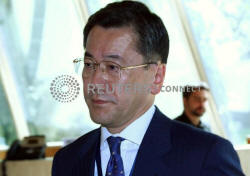South Korea protests Japan's 'grave' plan to drop it from smooth-trade
list
 Send a link to a friend
Send a link to a friend
 [July 24, 2019] By
Ju-min Park [July 24, 2019] By
Ju-min Park
SEOUL (Reuters) - South Korea protested on
Wednesday against a Japanese plan to remove it from a list of countries
that face minimum trade restrictions, saying it would undermine their
decades-old economic and security cooperation and threaten free trade.
Japan's planned revision of a law to take South Korea off its so-called
white list comes amid a deepening row over compensation for wartime
forced labor and after Japan tightened curbs this month on exports to
South Korea of high-tech materials used for making memory chips and
display panels.
South Korea's industry ministry said in a statement Japan's removal of
South Korea from the list would undermine their economic and security
partnership.
It asked Japan to scrap the plan, flagging concerns over wider
disruptions of global supply chains involving South Korean chip and
screen makers.
"It is a very grave matter that shakes the foundation of South
Korea-Japan economic partnership and Northeast Asian security
cooperation that has been maintained and developed for more than 60
years," Sung Yoon-mo, the South Korean industry minister, told a
briefing.

"Removal of South Korea from the white list of countries is against
international norms and we are worried about its serious negative impact
on global value chains and free trade," Sung said.
Japan is due to decide on a revision of its list after canvassing public
opinion, which was due to be done by Wednesday.
Japan will "steadily progress" with the removal process, Japanese Trade
Minister Hiroshige Seko told reporters, adding that each country can
make its own decision regarding the white list.
Japanese broadcaster NHK reported that an unusually large number of
opinions had been submitted - more than 10,000 - and most were in favor
of dropping South Korea.
The government was looking to implement the change as early as next
month, NHK said.
Questions over the list come after Japan this month tightened curbs on
exports of high-tech materials to South Korea.
The restrictions came as Japan complained of the erosion of trust with
South Korea after a South Korean court ruled last year that Japanese
companies had to pay compensation to South Koreans forced to work in
Japanese factories during Japan's occupation of the Korean peninsula
from 1910 to 1945.
[to top of second column] |

Shingo Yamagami, director-general of the Economic Affairs Bureau at
the Ministry of Foreign Affairs of Japan arrives for the General
Council meeting where the worsening trade and diplomatic dispute
between South Korea and Japan will be raised at the World Trade
Organization (WTO) in Geneva, Switzerland, July 24, 2019.
REUTERS/Denis Balibouse

Japan believes the issue was settled under a 1965 treaty and the court ruling
violated international law.
Japan's top government spokesman said on Wednesday relations with South Korea
were in a "very severe" state.
'LONG-TERM HARM'
U.S. tech industry groups with members including Apple sent an open letter on
Tuesday to Japan and South Korea calling for a quick resolution of their
dispute.
"Non-transparent and unilateral changes in export control policies can cause
supply chain disruptions, delays in shipments, and ultimately long-term harm to
the companies that operate within and beyond your borders and the workers they
employ," the groups said.
Apple is a major customer of South Korean memory chip giants Samsung Elec and SK
Hynix.
South Korea has stepped up diplomatic efforts to get Japan to scrap its trade
controls, asking the United States to help, though it has not rushed to step in.
South Korean Foreign Minister Kang Kyung-wha discussed the problem with visiting
U.S. national security adviser John Bolton in Seoul on Wednesday.
They agreed to continue discussions on a U.S. role in finding a diplomatic
solution, Kang's ministry said in a statement.
For years, the United States counted on a united stand with Japan and South
Korea to stand up to what all three have seen as North Korean aggression.

Over the past year, U.S. President Donald Trump has sought to resolve the North
Korea dispute with a personal approach to its leader, Kim Jong Un.
(Reporting by Ju-min Park; additional reporting by David Dolan, Kiyoshi Takenaka,
Makiko Yamazaki in Tokyo and Jane Chung and Heekyong Yang in Seoul; Editing by
Robert Birsel and Nick Macfie)
[© 2019 Thomson Reuters. All rights
reserved.] Copyright 2019 Reuters. All rights reserved. This material may not be published,
broadcast, rewritten or redistributed.
Thompson Reuters is solely responsible for this content. |